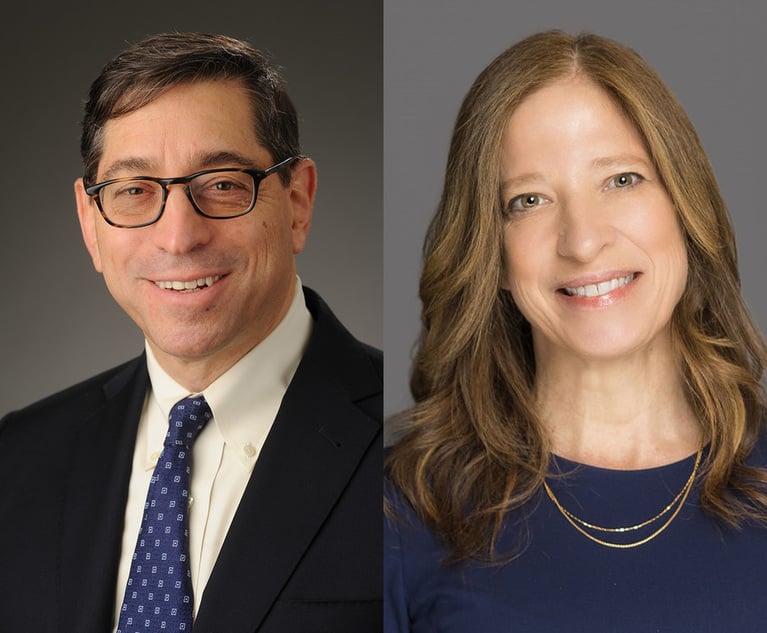 Adam J. Levitt, founding partner of DiCello Levitt. Courtesy photo
Adam J. Levitt, founding partner of DiCello Levitt. Courtesy photo Arguing Class Actions: Ringing the Bellwether—A Better Approach to Complex Multidistrict Litigation
Arguing Class Actions is a monthly column by Adam J. Levitt for the National Law Journal.
August 05, 2024 at 06:00 AM
7 minute read
CommentaryMultidistrict litigations are usually complex and often very expensive. A "typical" MDL progresses as follows: cases alleging similar misconduct by the same defendant (or defendants) are filed in various courts across the United States. Following motion practice, the Judicial Panel on Multidistrict Litigation decides whether to transfer and centralize those cases for all pretrial purposes, pursuant to 28 U.S.C. § 1407. Should the JPML rule in favor of transfer, the cases are transferred to and centralized in a single federal court for determination of pretrial issues. The transferee court then appoints plaintiffs' lead counsel, followed by the plaintiffs filing their master complaint, which the defendants almost inevitably (some might say reflexively) move to dismiss. Assuming that the transferee court sustains the complaint, pretrial issues (including, as applicable, class certification) through summary judgment are handled by the transferee court; and, finally, if there isn't a global settlement or dismissal on summary judgment, the MDL end-game proceeds in a series of "bellwethers"—trials either in the transferee court or back in the originating courts across the U.S. that, in theory, provide clarity to the parties regarding the merits of the case and help to determine the ultimate parameters for a global resolution.
While the MDL process is clearly essential—indeed, despite its flaws, one shudders to think of the efficiency lost if the process did not exist—MDLs often present unique problems in consumer cases. In a typical consumer case involving, say, the purchase of an allegedly defective good, chances are that the harm was felt in every jurisdiction across the U.S. As a result, the master complaint, even of a seemingly simple case, would need to cover all 50 states, alleging torts that often have subtle variations across jurisdictions. The many-hundred-page complaint would need to be digested by the transferee court, which could decide it must unpack the variability among 50 separate states' laws as part of its lengthy opinion on the dismissal motion. The result: It often takes an incredibly long period of time, and great expense, to get even the most righteous case going.
NOT FOR REPRINT
© 2025 ALM Global, LLC, All Rights Reserved. Request academic re-use from www.copyright.com. All other uses, submit a request to [email protected]. For more information visit Asset & Logo Licensing.
You Might Like
View All
Restoring Antitrust: Returning to the Consumer Welfare Standard

New York Mayor Adams Attacks Fed Prosecutor's Independence, Appeals to Trump
5 minute read

The Marble Palace Blog: Supreme Court Books You Should Read in 2025
Trending Stories
- 1'Reverse Robin Hood': Capital One Swarmed With Class Actions Alleging Theft of Influencer Commissions in January
- 2Hawaii wildfire victims spared from testifying after last-minute deal over $4B settlement
- 3How We Won It: Latham Secures Back-to-Back ITC Patent Wins for California Companies
- 4Meta agrees to pay $25 million to settle lawsuit from Trump after Jan. 6 suspension
- 5Stevens & Lee Hires Ex-Middle District of Pennsylvania U.S. Attorney as White-Collar Co-Chair
Who Got The Work
J. Brugh Lower of Gibbons has entered an appearance for industrial equipment supplier Devco Corporation in a pending trademark infringement lawsuit. The suit, accusing the defendant of selling knock-off Graco products, was filed Dec. 18 in New Jersey District Court by Rivkin Radler on behalf of Graco Inc. and Graco Minnesota. The case, assigned to U.S. District Judge Zahid N. Quraishi, is 3:24-cv-11294, Graco Inc. et al v. Devco Corporation.
Who Got The Work
Rebecca Maller-Stein and Kent A. Yalowitz of Arnold & Porter Kaye Scholer have entered their appearances for Hanaco Venture Capital and its executives, Lior Prosor and David Frankel, in a pending securities lawsuit. The action, filed on Dec. 24 in New York Southern District Court by Zell, Aron & Co. on behalf of Goldeneye Advisors, accuses the defendants of negligently and fraudulently managing the plaintiff's $1 million investment. The case, assigned to U.S. District Judge Vernon S. Broderick, is 1:24-cv-09918, Goldeneye Advisors, LLC v. Hanaco Venture Capital, Ltd. et al.
Who Got The Work
Attorneys from A&O Shearman has stepped in as defense counsel for Toronto-Dominion Bank and other defendants in a pending securities class action. The suit, filed Dec. 11 in New York Southern District Court by Bleichmar Fonti & Auld, accuses the defendants of concealing the bank's 'pervasive' deficiencies in regards to its compliance with the Bank Secrecy Act and the quality of its anti-money laundering controls. The case, assigned to U.S. District Judge Arun Subramanian, is 1:24-cv-09445, Gonzalez v. The Toronto-Dominion Bank et al.
Who Got The Work
Crown Castle International, a Pennsylvania company providing shared communications infrastructure, has turned to Luke D. Wolf of Gordon Rees Scully Mansukhani to fend off a pending breach-of-contract lawsuit. The court action, filed Nov. 25 in Michigan Eastern District Court by Hooper Hathaway PC on behalf of The Town Residences LLC, accuses Crown Castle of failing to transfer approximately $30,000 in utility payments from T-Mobile in breach of a roof-top lease and assignment agreement. The case, assigned to U.S. District Judge Susan K. Declercq, is 2:24-cv-13131, The Town Residences LLC v. T-Mobile US, Inc. et al.
Who Got The Work
Wilfred P. Coronato and Daniel M. Schwartz of McCarter & English have stepped in as defense counsel to Electrolux Home Products Inc. in a pending product liability lawsuit. The court action, filed Nov. 26 in New York Eastern District Court by Poulos Lopiccolo PC and Nagel Rice LLP on behalf of David Stern, alleges that the defendant's refrigerators’ drawers and shelving repeatedly break and fall apart within months after purchase. The case, assigned to U.S. District Judge Joan M. Azrack, is 2:24-cv-08204, Stern v. Electrolux Home Products, Inc.
Featured Firms
Law Offices of Gary Martin Hays & Associates, P.C.
(470) 294-1674
Law Offices of Mark E. Salomone
(857) 444-6468
Smith & Hassler
(713) 739-1250








